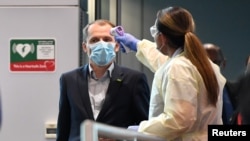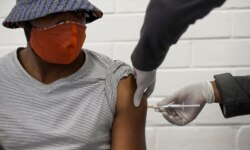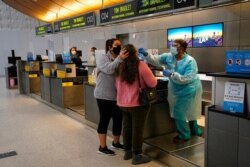The Australian airline company Qantas says it will require international travelers in the future to prove they have been vaccinated against COVID-19 in order to fly, as another pharmaceutical company announces progress in creating a potential vaccine to fight the coronavirus.
In an interview with Australia's Nine Network on Monday, Qantas Chief Executive Alan Joyce said the company thinks such proof will be a necessity for international visitors in the future, adding, "whether you need that domestically, we'll have to see what happens."
He said of requiring proof of vaccination, "I think that's going to be a common thing, talking to my colleagues in other airlines around the globe."
His remarks point to how some industries and companies might want to use proof of COVID-19 vaccinations in their business models going forward, potentially setting up legal challenges from those who oppose such measures.
The comments come as AstraZeneca said early Monday that clinical trials of its COVID-19 vaccine in Britain and Brazil have shown it is "highly effective in preventing COVID-19" without "hospitalizations or severe cases of the disease" in any of the trial's volunteers.
The England-based pharmaceutical company says the vaccine was 70% effective overall, but there were differences between two dosing regimens. One was 90% effective. The other was 62%.
"More data will continue to accumulate, and additional analysis will be conducted, refining the efficacy reading and establishing the duration of protection," AstraZeneca said in a statement Monday.
"These findings show that we have an effective vaccine that will save many lives," Professor Andrew Pollard, chief investigator of the Oxford Vaccine Trial at Oxford, said in a statement.
AstraZeneca said it "will seek an Emergency Use Listing from the World Health Organization for an accelerated pathway to vaccine availability in low-income countries. In parallel, the full analysis of the interim results is being submitted for publication in a peer-reviewed journal."
Drugmakers Pfizer and Moderna have also announced initial results from late-stage trials showing their vaccines were nearly 95% effective.
Vaccination plans
Countries have begun laying out plans to distribute COVID-19 vaccines, with Germany and the United States preparing to vaccinate some populations as early as next month.
German Health Minister Jens Spahn told reporters Sunday that there "is reason to be optimistic" that a vaccine would be approved in Europe before the end of the year, and that after approval, vaccinations could begin "right away."
The United States has set preliminary plans to begin vaccinating some groups as early as December 12, two days after the U.S. Food and Drug Administration is scheduled to review the Pfizer vaccine.
Health care workers in the United States, who have been hard-hit by COVID-19, would be among the first to receive a vaccine.
WATCH: Vaccines Raise Hopes of Rapid Global Rollout
In other developments, England said it would introduce a new system in mid-December allowing passengers arriving from high-risk countries to take a COVID-19 test after five days of quarantine, allowing them to be released if they test negative.
British Airways said the new scheme was "a significant step in the right direction." Airlines have been calling for such a step for months, arguing that strict quarantine rules deter people from traveling.
COVID numbers
In the United States, health officials continue to plead with Americans to stay home for the Thanksgiving holiday as the country fights a surge in COVID-19 infections.
The most populous county in the United States, Los Angeles, is on the brink of a stay-home order after a coronavirus surge there surpassed a level set by county officials to trigger such an order. County supervisors plan to meet Tuesday to decide whether to follow through with the order after the county reached an average of 4,500 cases per day.
California Governor Gavin Newsom and his family are in quarantine after three of his children were exposed to a Highway Patrol officer who tested positive for COVID-19.
The Associated Press reports that China has imposed new lockdowns on three cities, Shanghai, Tianjin and Manzhouli, where a handful of COVID-19 cases have reemerged.
More than 59 million people around the world have been infected with the coronavirus, the Johns Hopkins Resource Center reported Monday.
The United States continues to lead the world in infections with more than 12 million cases, followed by India with more than 9 million infections and Brazil with 6 million.
The virus has claimed nearly 1.4 million lives. More than a quarter million of those deaths were in the U.S.










